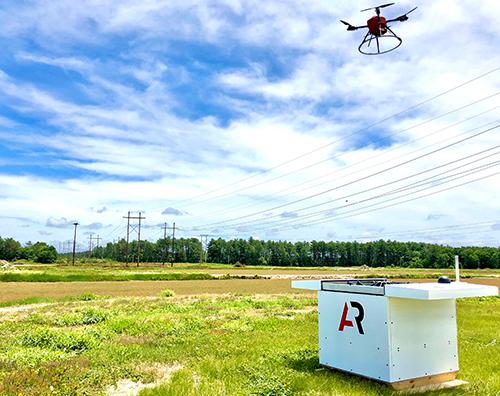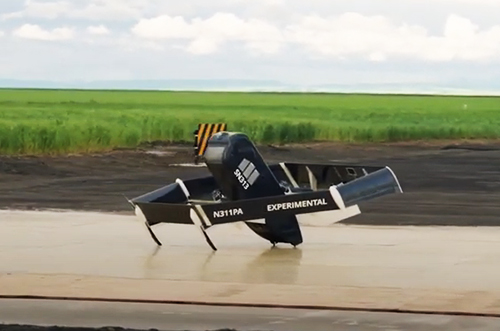American Robotics Gets FAA Approval to Operate First Fully Automated Drone for Commercial Use ‘Beyond Visual Line of Sight’ Bringing Unmanned Delivery of Medical Supplies and Clinical Laboratory Specimens a Step Closer to Reality
Boston-based American Robotics is approved to operate its Scout unmanned aircraft in rural areas and below a certain altitude, achieving a milestone that may allow the industry to ‘truly take off’
Routine drone delivery of clinical laboratory specimens and medical supplies moved a step closer to reality with the Federal Aviation Administration’s (FAA) green light to American Robotics (AR) to operate its fully automated drones without on-site pilots or on-the-ground spotters.
The Massachusetts-based company becomes the first drone operator to receive an FAA Certificate of Waiver, allowing it to operate its unmanned aircraft “beyond the visual line of sight (BVLOS) of the remote pilot in command.”
According to a news release, “Prior waivers and certifications awarded by the FAA required visual observers (VOs) stationed along the flight path to keep eyes on the airspace at all times, or required other burdensome restrictions such as infrastructure masking. … With this approval, American Robotics’ Scout System is now the first drone technology allowed to continuously operate without this costly human requirement.”
The FAA is restricting American Robotics’ operations to specific rural areas and at altitudes below 400 feet, with a maximum takeoff weight of 20 pounds, The Hill reported. Nevertheless, should AR’s automated Scout System prove safe, pilotless drones may soon be delivering clinical laboratory specimens and supplies to remote areas as well as to more densely populated hospital systems.
The FAA’s Certificate of Waiver is effective until January 31, 2023.
A New Era of Drone Delivery for Hospitals and Clinical Laboratories
Even with the restrictions, the FAA’s decision moves the commercial drone industry ever closer to routine transport of medical laboratory specimens and medical supplies by unmanned aerial vehicles (UAV).
“With these approvals, American Robotics is ushering in a new era of widespread automated drone operations,” Reese Mozer, CEO and co-founder of American Robotics, said in the news release. “Decades’ worth of promise and projection are finally coming to fruition. We are proud to be the first company to meet the FAA’s comprehensive safety requirements, which had previously restricted the viability of drone use in the commercial sector.”
The Wall Street Journal (WSJ) reported that the FAA’s decision signals the agency’s “broader effort to authorize widespread flights by shifting away from case-by-case exemptions for specific vehicles performing specific tasks.” According to the WSJ, the FAA’s approval documents state that American Robotics’ proposed operations will provide the agency with “critical data for use in evaluating BVLOS [beyond the visual line of sight] operations from offsite locations.”

Each American Robotics Scout drone (above) is stored within a weatherproof base station that enables autonomous charging, data processing, analysis, and data transmission. According to the news release, “Once installed in the field, all facets of Scout’s operation are automated, allowing this technology to gather and analyze ultra-high-resolution data multiple times per day for years without expensive human labor.” Clinical laboratory managers will want to watch for progress in using drones to deliver medical supplies. (Photo copyright: American Robotics.)
FAA Approval a ‘Game Changer’
In its quest to receive FAA approval, American Robotics completed a four-year testing program around its Scout line of UAV products. According to the company, Scout systems flew as many as 10 automated missions per day in 2020 for industrial and agricultural customers in multiple states capturing a variety of advanced data.
The Scout system addresses safety concerns by using acoustic detect-and-avoid technology to maintain a safe distance from other aircraft while also avoiding birds or other potential obstacles.
“The commercial drone industry is growing quickly and providing significant benefits to the American public, but enabling expanded operations beyond visual line of sight is critical for the industry to truly take off,” Lisa Ellman, JD, Partner at Hogan Lovells and Executive Director of the Commercial Drone Alliance, said in the news release.
“Automated beyond visual line of site operations are particularly important to opening the commercial sectors to the drone economy, including the agriculture and industrial verticals. Key to these operations is the use and FAA acceptance of new and innovative safety technologies, such as detect and avoid sensors and software-enabled automation.”
The agricultural and energy industries are seen as key beneficiaries of this latest FAA action. Lance Ruppert, Director of Agronomy Marketing and Technology at Growmark Inc., a leading US grower cooperative, calls the American Robotics’ approval a “game changer.”
“Our interest in American Robotics’ technology started with the desire to have a drone imagery solution that was reliable, scalable, and executed with minimal human resources,” Ruppert said in the news release. “This technology, along with the FAA approvals to operate it without humans on the ground, is key to making drones a widespread reality in our industry.”
Drone Delivery of Clinical Laboratory Specimens Worldwide
In, “UPS Expands Drone Delivery Service for Transporting Clinical Laboratory Specimens Across Healthcare Systems to Include Delivering Prescriptions from CVS Pharmacy to Customers’ Homes,” Dark Daily reported how the United Parcel Service (UPS) successfully delivered by air medical prescriptions from a CVS pharmacy to customers’ residences in Cary N.C. This was the next step in the package delivery company’s plan to become a major player in the use of drones in healthcare and it has major implications for clinical laboratories and pathology groups.
And past Dark Daily ebriefings reported on drone delivery of medical supplies being conducted in Virginia, North Carolina, Australia, Switzerland, and Rwanda. With potentially fully automated systems just around the corner, there’s no question the use of drones to transport critical medical supplies and biological specimens is poised for an amazing breakthrough.
While the FAA’s approval of the first fully automated commercial drone flights may not have an immediate impact on clinical laboratories, the increasing use of commercial drones brings drone transportation of lab specimens and other medical supplies one step closer to reality.
—Andrea Downing Peck
Related Information
FAA Approves First Fully Automated Commercial Drone Flights
US Department of Transportation FAA Certificate of Waiver
The FAA Just Greenlit This Drone to Fly Autonomously without a Human Nearby





